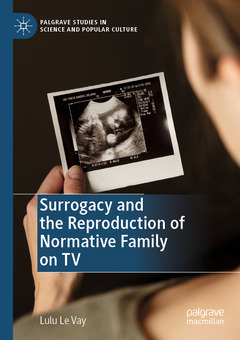Description
Surrogacy and the Reproduction of Normative Family on TV, 1st ed. 2019
Palgrave Studies in Science and Popular Culture Series
Author: Le Vay Lulu
Language: English
Subjects for Surrogacy and the Reproduction of Normative Family on TV:
Keywords
television; genetics; audience studies; homosexuality; female; sexuality; gender; mothers; romance; heterosexual; heteronormative; queer; infertility; children; body; technologies; baby; intimacy
Approximative price 52.74 €
In Print (Delivery period: 15 days).
Add to cartPublication date: 08-2020
258 p. · 14.8x21 cm · Paperback
Publication date: 06-2019
258 p. · 14.8x21 cm · Hardback
Description
/li>Contents
/li>Biography
/li>Comment
/li>
Chapter 1: Introduction.- Chapter 2: The reproduction of the family.- Chapter 3: Cultural narratives of the family.- Chapter 4: I want a baby!.- Chapter 5: Becoming ordinary.- Chapter 6: Infertile bodies.- Chapter 7: Queer futures.- Chapter 8: The Conclusion.




